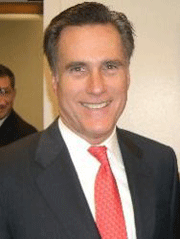Willard "Mitt" Romney (2008)

Candidate for the 2008 Republican presidential nomination
by Liz Olson
 Related Links |
Mitt Romney may lack the political experience of his rivals for the Republican presidential nomination, but his success in business and managing the 2002 Olympic Games has demonstrated an innate leadership ability.
Romney’s presidential campaign agenda is based on conservative principles, including small government, lower taxes, national security, and defending the traditional family.
Born into a politically active family in Detroit, Michigan, with roots in the Mormon Church, it was only natural that Romney would pursue a political career. His father, George W. Romney, was a 1968 presidential candidate and his mother, Lenore Romney, was a U.S. Senate candidate in 1970.
Business Career
Romney graduated with a B.A. from Brigham Young University, and then earned an M.B.A. and a J.D. from Harvard Business and Law schools. After graduating from Harvard, Romney began his business career with the Boston Consulting Group in 1974, and went on to become vice president of another Boston-based consulting firm, Bain & Company, Inc. In 1984, he co-founded Bain Capital, a private equity investment firm. He headed the company for 14 years, investing in or buying well-known companies such as Staples, Brookstone, Domino’s, and Sports Authority. He and his wife have accrued a net worth of between $190 and $250 million.
With a short political résumé, Romney draws on his business experience and his role on the 2002 Olympic Games committee as proof of his ability to run the nation. Romney was brought in as the president and CEO of the 2002 Salt Lake City Olympic Games in 1999 to rescue the games from fiscal crisis. He overhauled the committee’s leadership and policies, reduced budgets, and increased fundraising. He also coordinated a $300 million security budget to ensure safety at the Games in the wake of the September 11, 2001, attacks.
Massachusetts Politics
Romney’s political career has been brief; he served as the governor of Massachusetts for only one term. In 1994 he lost to Democrat Ted Kennedy in the race for the U.S. Senate. Kennedy, however, won by the slimmest margin in his nine terms in the Senate.
Despite a complaint filed by the Democratic Party about residency issues, Romney ran for governor of Massachusetts in 2002. He used $6.3 million of his own money during the campaign, and defeated Democrat Shannon O’Brien in the general election.
As governor, Romney created a scholarship program that rewards the top 25% of Massachusetts high school students with a tuition-free education to any Massachusetts public college or university. He also proposed and signed legislation that requires all Massachusetts residents to have health care.
Romney’s early support gave way to criticism over the explosive gay marriage issue in Massachusetts. He opposes same-sex marriages and civil unions, yet he backed a proposed state constitutional amendment in 2004 that would have allowed civil unions and banned gay marriage (the amendment failed to pass). He withdrew his support of this amendment, however, in favor of a 2005 petition that banned both. (In 2003, the Massachusetts Supreme Judicial Court ruled that barring gays and lesbians from marrying violates the state constitution.)
Campaign for President
After his term as Massachusetts governor ended in January 2007, Romney formally announced his candidacy for the Republican presidential nomination. While Romney is certainly not the first politician from Massachusetts to run for president, he does break the mold of Massachusetts liberal. Indeed, his campaign is aimed at the conservative wing of the Republican Party.
Articulate and polished, Romney seems at ease in front of a crowd. He remains on point and speaks in full sentences during his speeches. Regardless of his short political career, Romney’s business acumen is translating into success in fund-raising, allowing him to be one of the top contenders for the Republican nomination.
On December 6, 2007, Romney gave a 20-minute speech at the George Bush Presidential Library in Texas to address concerns expressed by many voters about his faith. "I believe in my Mormon faith and endeavor to live by it," said Romney, but he also stressed that his religious views would not affect his ability to be president.
Romney was doing well in early voting states, so it was argued he did not need to give a speech about his religion. However, it has been a sensitive issue since he began running for the Republican nomination, and his support has recently shifted in states like Iowa. Polls have shown that Americans would not vote for a Mormon candidate. According to evangelical Christians, who make up a significant amount of Republican votes, Mormonism is heretical.
Many people compared Romney's speech to one made by John F. Kennedy in 1960 about his Roman Catholic faith. Kennedy was trying to convince ministers, who were openly hostile of his faith, that his religion would not affect his governance. Romney, on the other hand, spoke in front of a friendly crowd.
In his speech, Romney advocated for religion to take a larger role in American public life. Romney stated that "no candidate should become the spokesman for his faith. For if he becomes president he will need the prayers of the people of all faiths."
- More from Campaign 2008
